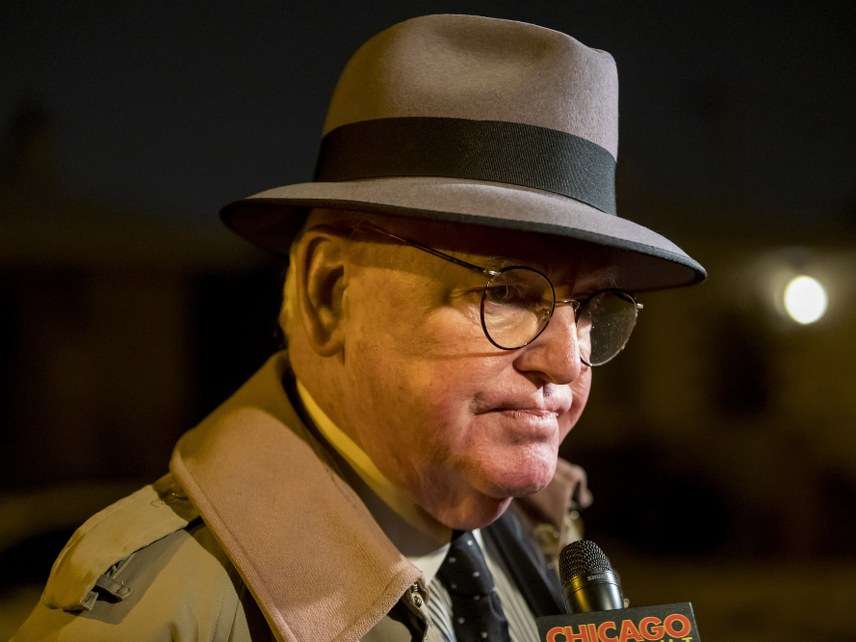Chicago Aldermen Dismayed Not by Corruption, but by One of Their Own Cooperating With the Feds
A retiring member of the Chicago City Council wore a wire to record conversations. He's being treated like a snitch…by city leaders.

Members of Chicago's City Council are absolutely aghast to discover a snitch among their own—an alderman who was secretly wearing a wire to help the feds investigate corruption. And they appear to be angrier about the recordings than the actual corruption.
Earlier in the month, Chicago Alderman Ed Burke was charged with trying to extort legal work and campaign donations from a Burger King franchise operator. Yesterday, the Chicago Sun Times broke the news that another alderman, Danny Solis, had been secretly recording his conversations with Burke in order to assist federal law enforcement.
The responses to this news from other aldermen in Chicago provides a fascinating look into the mindset of city leaders. They are shocked and horrified that Solis was recording them, and seem much less concerned by the idea that Burke was doing something wrong. Here are some choice quotes from the Chicago Tribune:
One longtime colleague of Solis' said she might cry about his wearing a wire because "you don't do that." Another alderman said that in his Southwest Side ward, "if you wear a wire someone's going to kick your ass." …
Black Caucus Chairman Ald. Roderick Sawyer, 6th, said he wouldn't wear a wire against fellow council members. Sawyer said the situation could cause distrust, with aldermen thinking twice when dealing with their colleagues.
"You would like to think someone would just take their punishment like they should take their punishment and not try to spread it to other people. It could be entrapment. It could be ensnaring somebody in something they would not normally do," Sawyer said. …
Ald. Carrie Austin, 34th, who's been on the council with Solis for more than two decades, said she didn't want to talk about Solis "because I might cry." Asked why she might cry, Austin responded, "You don't do that, you just don't."
There were other aldermen, though, who did note that the corruption scandals indicate they should maybe put the brakes on some things, and figure out whether or not some plans being put in place were in fact tainted by Burke's corruption.
Solis announced in November that he was retiring and would not be seeking re-election, and the Sun Times notes that in a previous television interview where he talked about his pending retirement (before Burke's indictment), he also suggested that Burke should consider retiring as well, perhaps hinting at what was to come.
These corruption scandals are nothing new for Chicago's ruling class. Solis was originally named alderman in 1996 to replace Ambrosio Medrano, who had been caught up in a FBI corruption investigation called Operation Silver Shovel. Medrano pleaded guilty to taking thousands of dollars in bribes. He has subsequently been convicted again and sent to prison, this time for paying bribes to try to secure government medical contracts and getting kickbacks.
But Medrano refused to wear a wire and assist the feds in Operation Silver Shovel, and for that, some aldermen hailed him as a stand-up guy. And while it might be admirable in private life for people to refrain from assisting the government in arresting people (particularly for vice-related crimes for which there are no victims), these are people who have tremendous control in Chicago over who is allowed to set up business in the city.
This corruption is not harmless. It prevents people from engaging in economic activity and building their own businesses in Chicago without first paying, or agreeing to pay, these alleged "stand-up guys" on the city council. While the reactions of Chicago's City Council members is entertaining in a horrifying way, it also downplays the very real effects of this corruption on citizens' lives. Eric Boehm previously noted Burke's extensive political reach and how much he wanted to control and ban any number of products and services. To what extent did financial considerations, rather than moral ones, play into Burke's policy-making? And who was harmed because of it?


Show Comments (18)